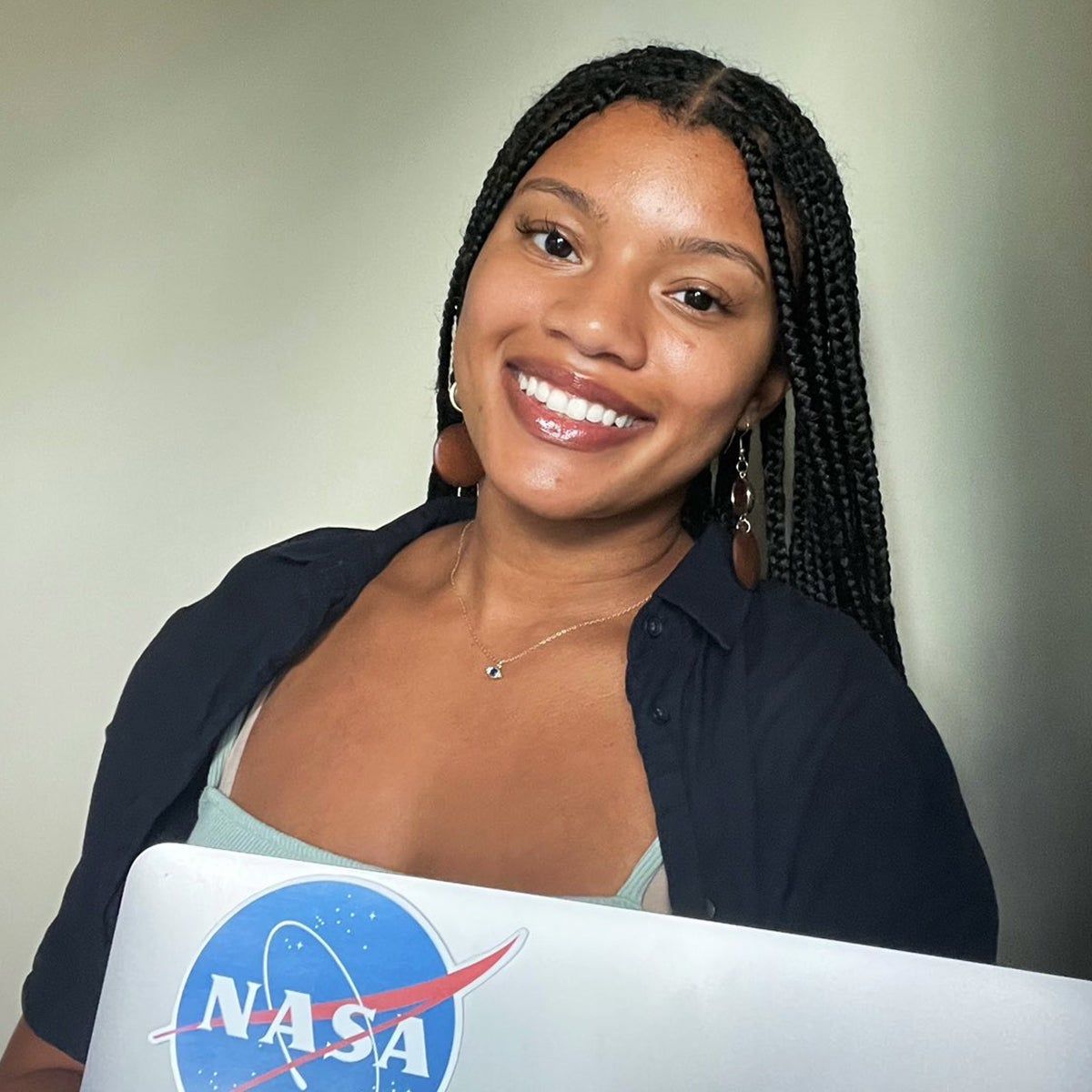
International Day of The Girl
Coloring the Future of Tech with Nia Asemota
- Interview By
- Katie Covington Crane
Can you tell us about yourself and where you are in your journey in STEM?
Growing up, I never thought that computer science would ever be a path for me. But I’m happy to share that I'm a senior at NYU, graduating this spring – studying computer science and biomolecular science. I'm interested in biotech, software engineering, and artificial intelligence and am currently in a Cornell Tech AI program where we are paired with big tech companies to build machine learning models and solve problems using artificial intelligence.
This summer, I was doing software engineering at NASA. A huge barrier in tech is just the language used, so we made a website to make everything accessible to the public. I was working on the front end of the satellite team, making the data and the images that NASA pulls from satellites accessible to the public so that everyone can see, understand, and interact with the data based on their location.
It can feel overwhelming for girls in tech spaces today. How did you kind of get started in tech, and were you a bit nervous?
My mom kept encouraging me to join my high school’s robotics team. The team had 36 members, and when I joined, I was one of five girls, so it was really daunting. I'm Puerto Rican and Nigerian, so I was one of the only ones who looked like me, and I thought, "I don't know how to code; I didn't use any of these tools." It was scary, and I felt like I was on the outside looking in since it was mostly the guys taking care of actual programming, building the robots, and everyone else organizing a toolbox or cleaning up.
I decided I wanted to do more. I was a part of FIRST Robotics, a competition where we had six weeks to build a robot. There are no instructions; you have guidelines (like the robot can't exceed this height or weight), and there are different game challenges where we had to build a robot to fit the challenge. For three days we competed at the Jacob Javits Center with teams from China, Australia, and all over the world. There was an all-women's team I met there, and I talked to them, and I thought, "I can do this!" So I went on YouTube to teach myself how to code and the basics of electrical engineering. For example, the robot has wheels to turn - How do I do that? What wires do I connect?
I was able to apply the knowledge that I learned through the screen slowly but surely, and when I left high school, I was leading the programming and electric department. That was my first introduction to tech, and it made me realize I love creative problem solving and hands-on learning.
Wow! And then, how did you get involved with Black Girls CODE?
I first found out about Black Girls CODE when I was a junior in high school. Upon searching for colleges, I discovered that NYU has a partnership with Black Girls CODE, so I signed up for my first workshop in Chelsea at the Google office, making video games. The instructors were super helpful, and I just loved everything about the experience. When I went to college, I started teaching as one of the technical instructors, and I've been with them ever since, working with the girls as young as seven, teaching them how to build robots and build apps with their little virtual reality headsets – it's adorable.
Did teaching inspire you to create your Black Girls CODE the Future' Coloring Book?
I like to joke around and say that I’ve been creating art ever since I could hold a crayon. At the beginning of quarantine, everything was chaotic, I didn't know what was going on, and I just needed a mental break, so I started drawing again. I got an iPad and got into digital illustration. I created an art page highlighting the beauty of people who look like me in tech.
When I start drawing, it's black and white line drawings, and then I fill in the colors, but I realized the first step looks just like a coloring book. So I texted Kimberly, the founder of Black Girls Code, and told her that I had this idea for a coloring book, and she loved it! Our first idea was to do it digitally, but now I print them out and go to the post office to ship orders in between classes.
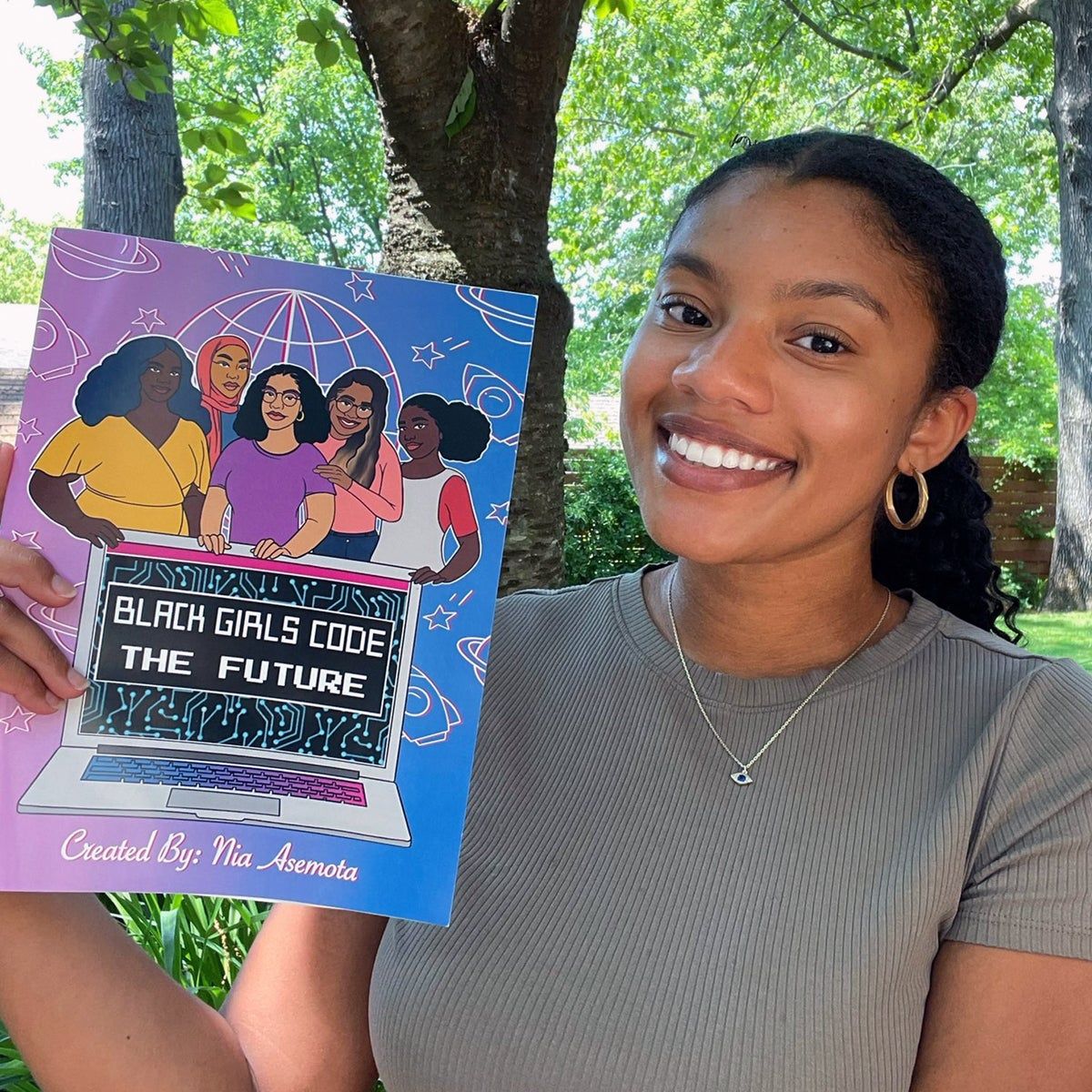
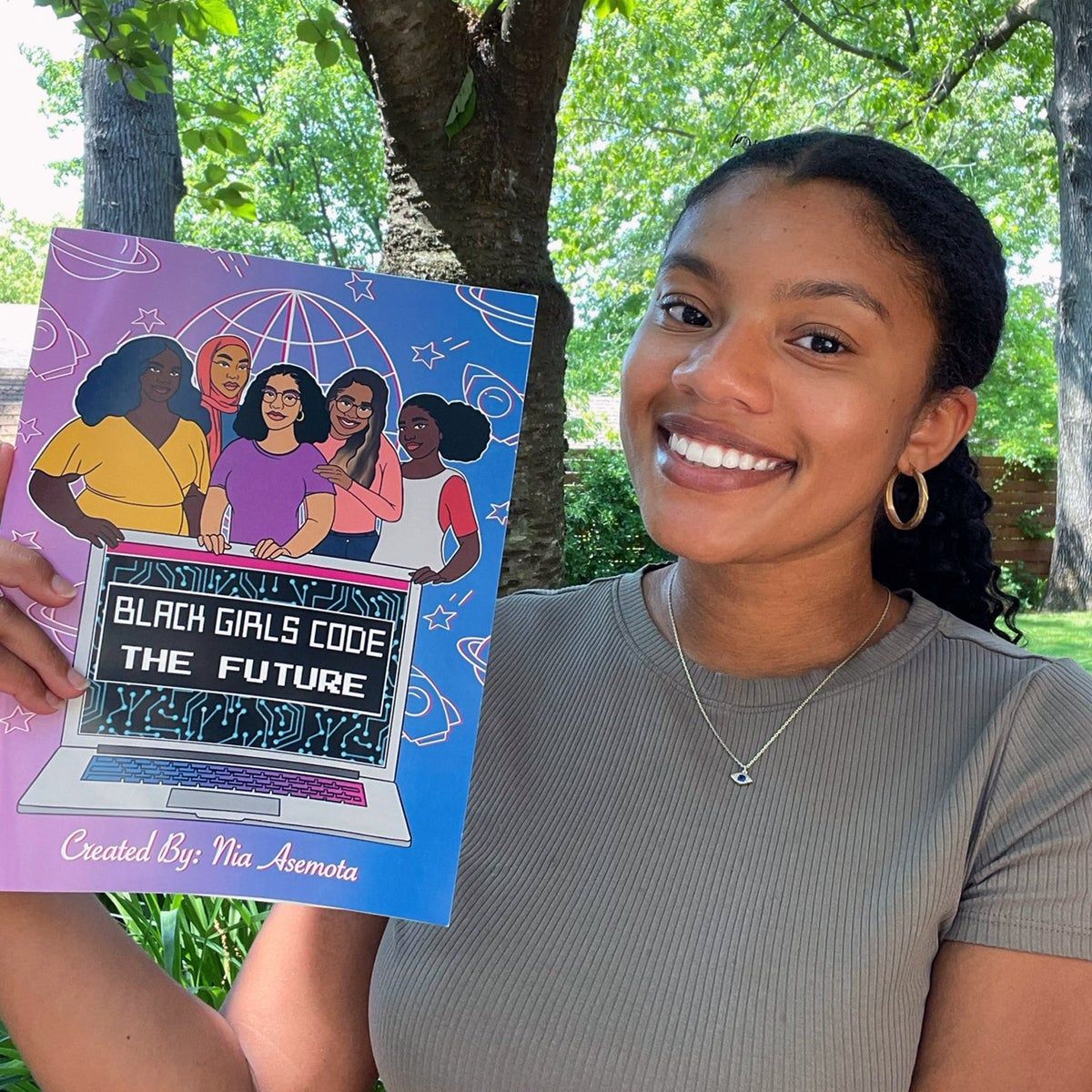
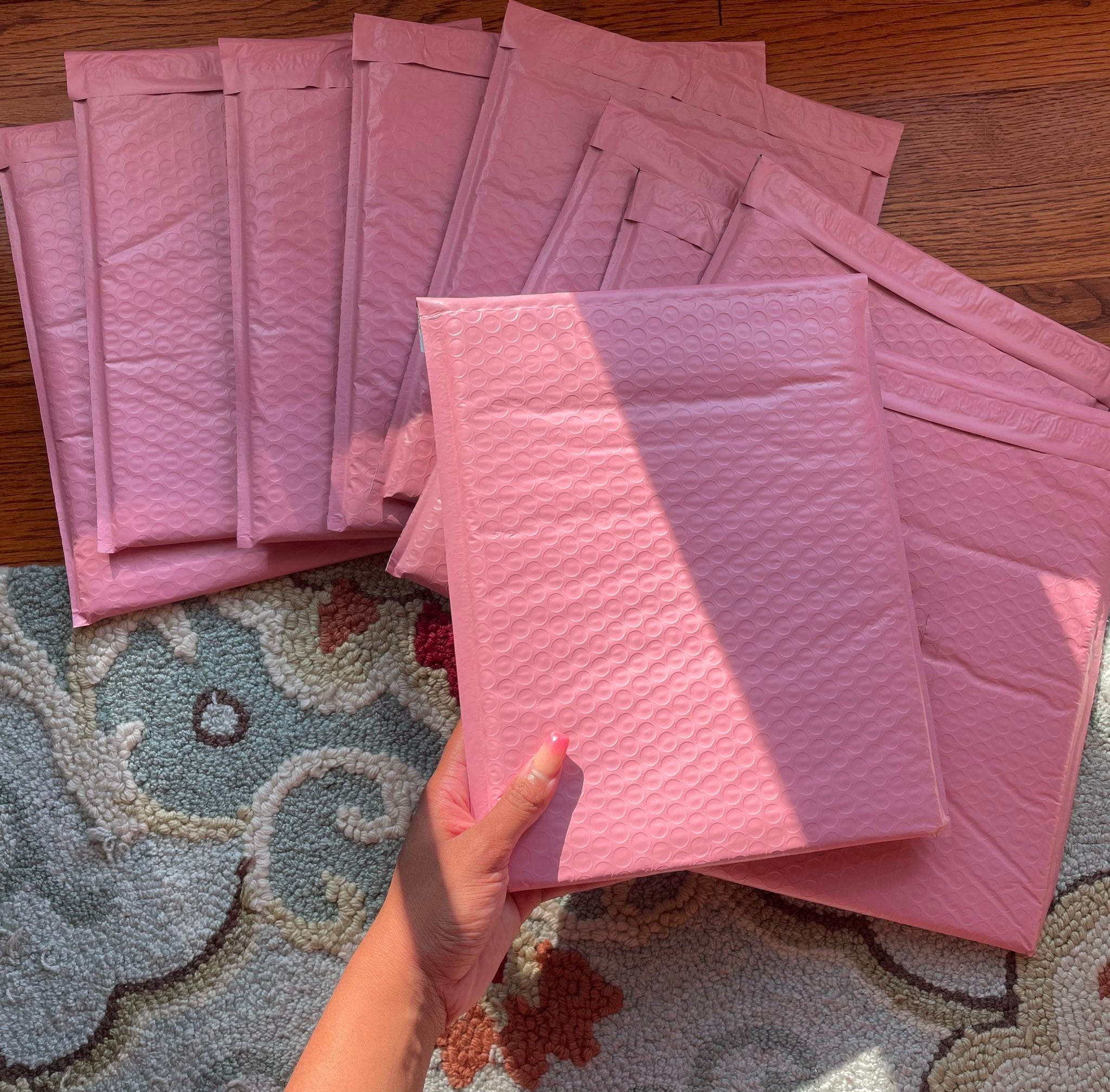
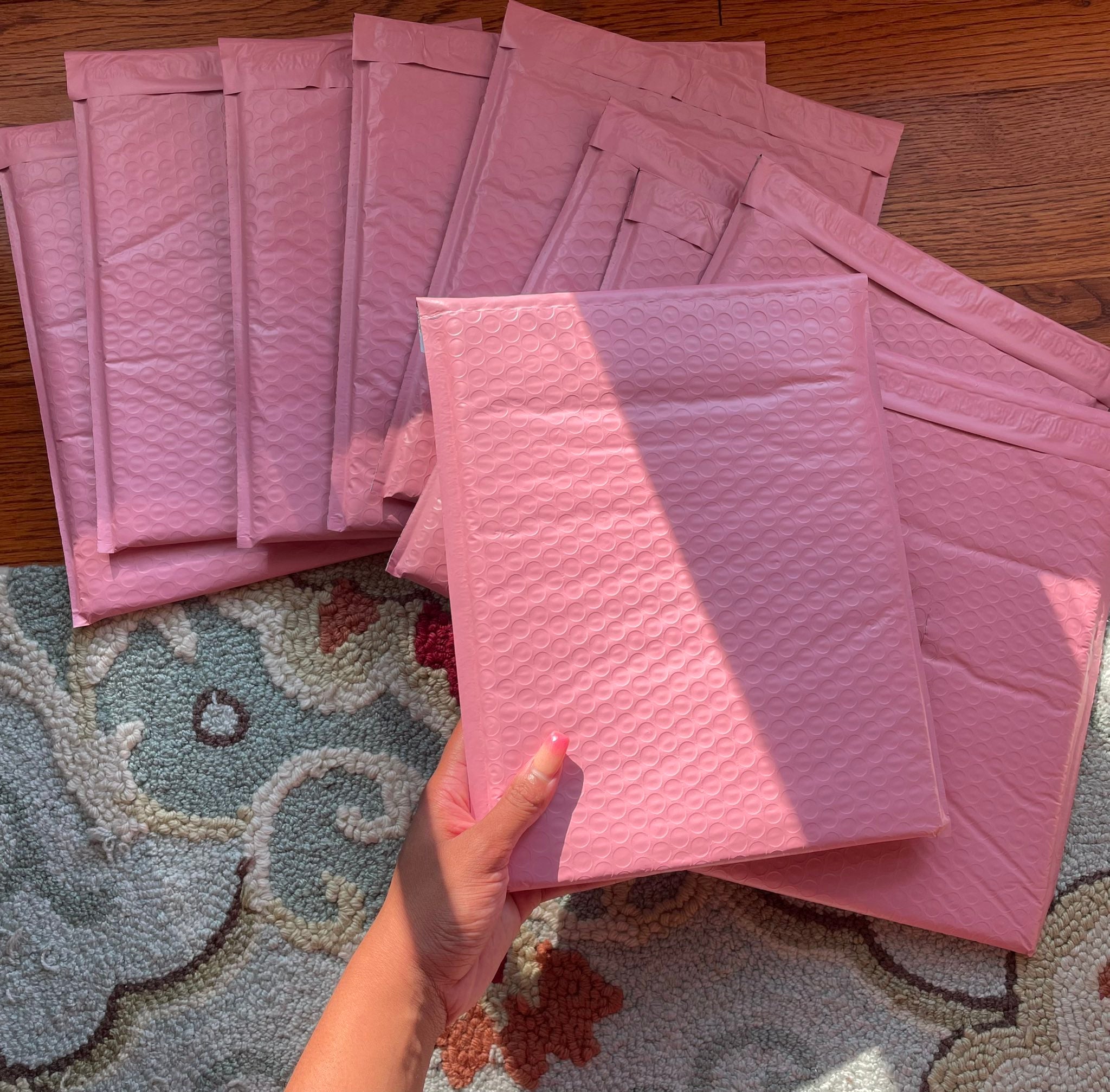
Can you share a bit about what's in the book? What did you think was essential to include?
The book starts with pages where girls meet the artist (me!) and then meet the founder and CEO of Black Girls CODE. After that, I did a word search to learn words like computer, algorithm, and programming.
In my Computer Science class, there were over 100 students, and there were three students who looked like me. Unfortunately, a lot of women of color don't get the opportunity to see themselves as role models in the tech space, so I thought all these people at NASA, people working in artificial intelligence that I wish I knew about when I was younger, were really important to include. So, in the second part, I highlight women in tech and science doing inspiring work – their names, what they do, and a quote from them to inspire the girls.
One of the women I included in the book is Joy Buolamwini, an MIT computer scientist and digital activist who is a huge inspiration to me – making waves and breaking barriers in the AI space.
I close the book with a thoughts and ideas page for girls to take notes and reflect.
Next, I want to make a series highlighting different underrepresented groups and their stories, all these amazing people and role models. And make stickers!
What's next for you and what excites you about the future of tech?
I'm getting involved in artificial intelligence, especially since AI impacts so much of our lives. In class, we talk about different applications for AI, and you have to back up and understand "Who is this affecting?" That's a massive issue that a lot of people don't think about, but for me, I want to understand the building blocks: What is the formula to get the model? When we build the model, who is it affecting? Who are we leaving out? Are we creating diverse teams?
For example, in California, they tested robots to deliver food, but people with wheelchairs ended up getting stuck at the crosswalk trying to cross the street because the robots were in the curb cuts. They were occupying the space people needed to get onto the sidewalk safely. People didn't think about that at first, and it posed a major problem. People with crutches, wheelchairs, people with walkers could be stuck in the street in traffic because there's a robot in the way.
I want to ask these questions to find out how we can build a better future. When you hear about robots or AI, you think about those movies where AI takes over humanity, but how do we change that narrative and make everyone comfortable? We have to make sure to include everyone we build new technology.
What advice do you have for younger girls who are thinking about tech?
I would say to push for it and do it! Find community. Communities like Black Girls CODE can support you. I joined organizations like NSBE or SHPE, and Society of Women Engineers to gain support. Knowing there are other people who look like me or other people from where I'm from, who are doing things that I love to do, is a huge reason I created this coloring book. I want girls to know the narrative isn't written for you. Your path is your path; create it as you want to.
Don't be afraid to ask for help. Don't be afraid to reach out. Feel confident about what you want to do. There's a lot of resources to help you. There's a lot of space in the tech space and spaces for people to feel like they belong, that they're seen, that they're heard.
You can follow along with Nia’s journey in tech on Instagram and Twitter. Don’t forget to purchase a copy of the Black Girls CODE the Future Coloring Book.